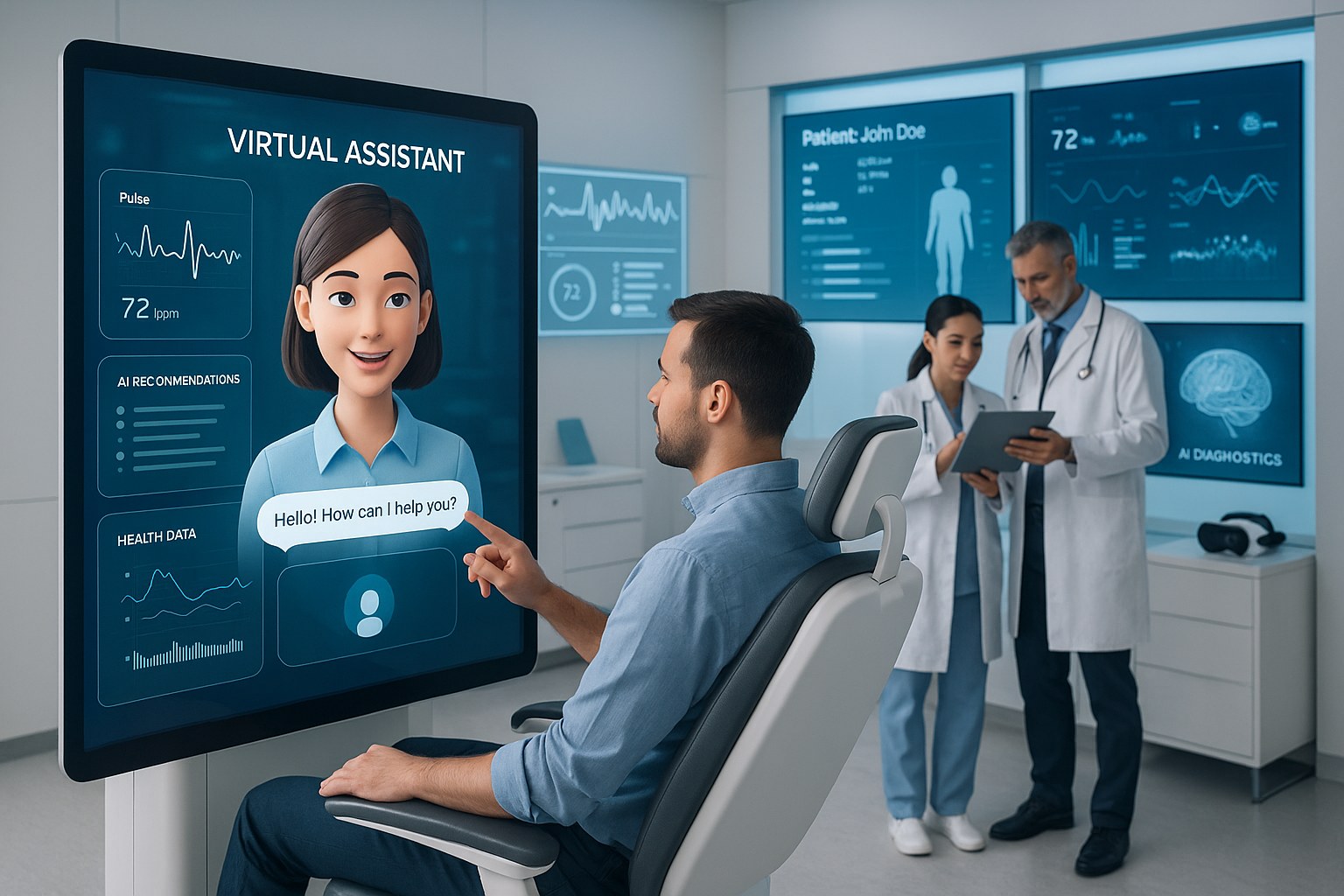
Conversational AI in Healthcare: The Ultimate 2025 Guide

Conversational AI in healthcare is no longer a futuristic buzzword; it's a critical component of the modern medical ecosystem. This powerful technology, driven by Natural Language Processing (NLP) and advanced Machine Learning (ML), is the definitive answer to some of the industry's most enduring challenges. From rising operational costs and chronic staff shortages to the overwhelming burden of administrative tasks, AI-powered solutions are delivering measurable results.
The market growth for healthcare chatbots and virtual assistants is a clear indicator of this shift. Healthcare organizations are rapidly adopting these tools to build a more resilient, efficient, and patient-centric system.
This guide will explore the applications of conversational AI in healthcare, the technology that powers it, the ethical challenges we must navigate, and what the future holds for this transformative field.
This article covers:
-
The evolution from simple chatbots to sophisticated AI assistants.
-
Core technologies like NLP, LLMs, and Generative AI.
-
Key applications for both patients and healthcare providers.
-
Critical challenges including data privacy, HIPAA compliance, and AI bias.
-
A look at privacy-first platforms like Sherpa.ai.
-
The future of AI in medicine.
How Did AI in Healthcare Evolve From Sci-Fi to Standard Practice?
The journey of AI in medicine began decades ago with rule-based systems like ELIZA in the 1960s, which could only mimic conversation through clever pattern matching. For years, these systems were limited by rigid scripts, unable to understand context or deviate from pre-programmed paths.
The last decade has catalyzed a paradigm shift, thanks to a perfect storm of innovation:
-
Explosion of Health Data: The widespread adoption of Electronic Health Records (EHRs) created vast, invaluable datasets for training AI models.
-
Accessible Supercomputing Power: Cloud platforms provided the immense computational horsepower needed to process complex algorithms and massive datasets.
-
Algorithmic Breakthroughs: The development of advanced neural networks, especially the Transformer architecture that powers Large Language Models (LLMs), gave AI a near-human ability to understand and generate language.
This evolution has taken us from frustrating, dead-end chatbots to the intelligent virtual health assistants that are now being integrated directly into clinical workflows.
What Technology Powers Conversational AI in Healthcare? (NLP & LLMs Explained)
To trust conversational AI in healthcare, it's essential to understand the technology working behind the scenes.
Natural Language Processing (NLP):
The AI's Ability to Understand NLP is the core technology that allows machines to comprehend human language. In a medical context, its capabilities are highly specialized.
-
Named Entity Recognition (NER): This allows the AI to read a sentence like, "The patient has a fever of 102°F and a history of asthma," and immediately identify "fever" as a symptom, "102°F" as a vital sign, and "asthma" as a chronic condition.
-
Intent Recognition: The AI understands the user's goal. "Book a check-up" is recognized as a scheduling request, while "refill my prescription" triggers a pharmacy workflow.
-
Sentiment Analysis: The AI can detect a patient's emotional tone—such as anxiety or frustration—and tailor its response to be more empathetic.
Machine Learning (ML) and Generative AI:
The Engine for Intelligence Modern AI in healthcare applications are powered by ML models that learn from data. The most advanced of these are Generative AI and LLMs. When fine-tuned on vast libraries of medical research, clinical guidelines, and anonymized patient data, these models can:
-
Generate coherent, context-aware clinical summaries.
-
Draft empathetic and accurate responses to patient questions.
-
Power sophisticated AI symptom checkers with high accuracy.
How is AI Revolutionizing the Patient Experience? 🩺
For patients, conversational AI in healthcare acts as a reliable, ever-present digital front door, improving access and empowering them to manage their health proactively.
24/7 Symptom Checking and Intelligent Triage
AI-powered symptom checkers guide patients through a series of clinically validated questions to assess their condition. Based on the patient's responses, the AI can confidently recommend the next steps: self-care at home, a telehealth consultation, or an urgent care visit, optimizing resource use and ensuring timely care.
Appointment Scheduling and Reminders
One of the most immediate benefits of AI in healthcare is the automation of scheduling. Patients can book, change, or cancel appointments through a simple chat interface, 24/7, without human intervention. This has been shown to dramatically reduce patient no-shows and ease the burden on front-desk staff.
Enhanced Medication Adherence and Management
AI assistants act as personal medication managers, sending intelligent reminders, answering questions about side effects, and flagging potential drug interactions. For patients with chronic diseases, this proactive support is a game-changer for improving health outcomes. [Read our detailed report on AI in chronic disease management].
Accessible Mental Health
AI Assistants Mental health chatbots are providing crucial support by offering a confidential and accessible platform for users to engage in CBT exercises, practice mindfulness, and track their moods. They are a vital tool in bridging the gap in mental healthcare access.
How Does AI Empower Doctors and Reduce Clinician Burnout? 🧑⚕️
Clinician burnout, driven by administrative overload, is a critical crisis. AI for patient engagement and clinical support is a powerful solution.
Automating Clinical Documentation with AI Scribes
Perhaps the most impactful application is AI clinical documentation. Ambient AI scribes listen securely to doctor-patient conversations and automatically generate structured clinical notes. This eliminates hours of "pajama time" spent on EHR data entry, allowing physicians to focus entirely on their patients.
Streamlining Repetitive Administrative Tasks
From patient intake and insurance verification to answering billing questions, conversational AI automates the time-consuming administrative tasks that bog down clinical staff. This frees up nurses and medical assistants to perform higher-value clinical duties.
Providing Real-Time Clinical Decision Support
Integrated AI assistants can act as a physician's co-pilot. A doctor can ask, "What are the contraindications for this medication in a patient with liver disease?" and receive an instant, evidence-based answer sourced from trusted medical databases.
What are the Ethical Challenges and Risks of AI in Healthcare? ⚖️
Deploying conversational AI in this high-stakes field requires a deep commitment to navigating its ethical and security challenges.
Ensuring Patient Data Privacy and HIPAA Compliant AI
Protecting patient data is non-negotiable. Any conversational AI in healthcare must be built on a foundation of security that adheres to regulations like HIPAA. This requires end-to-end data encryption, strict access controls, and transparent data handling policies.

Mitigating Bias to Promote Health Equity
AI models trained on biased or non-representative data can perpetuate health disparities. It is ethically imperative for developers to audit training datasets, test for algorithmic bias across diverse populations, and implement human-in-the-loop systems to ensure equitable outcomes for all patients.
The Problem of Accuracy and AI "Hallucinations"
LLMs can sometimes generate incorrect information, a phenomenon known as "hallucination." In healthcare, this risk is unacceptable. AI systems must have robust "guardrails" that prevent them from providing incorrect medical advice and are designed to escalate to a human expert when faced with uncertainty.
(Case Study: How Privacy-First Platform Solves Key Challenges
Addressing the critical need for data privacy, Sherpa.ai are pioneering privacy-first AI solutions. Their approach is directly tailored to sensitive industries like healthcare.
The core of the Sherpa.ai platform is its use of technologies like federated learning. In this model, instead of sending sensitive patient data to the cloud, the AI algorithm is brought securely to the user's device. The AI learns and personalizes its responses on the local device, ensuring that personal health information never leaves the user's control. Only anonymized insights are used to improve the overall model.
This on-device, privacy-centric model is a breakthrough for building HIPAA compliant AI because it:
-
Drastically reduces the risk of cloud-based data breaches.
-
Builds patient trust by guaranteeing data privacy.
-
Allows for deep personalization without compromising security.
This approach provides a blueprint for how to responsibly deploy powerful AI assistants in healthcare, balancing innovation with the fundamental right to privacy.
What is the Future of Artificial Intelligence in Medicine? 🔮
The integration of conversational AI in healthcare is still in its early stages. The next decade promises even more profound transformations.
-
Ambient Intelligence: The exam room will become a smart environment where AI works invisibly in the background, handling all documentation and data retrieval tasks automatically.
-
Hyper-Personalization: AI will integrate with genomic data, wearables, and lifestyle information to offer truly personalized health coaching and treatment plans.
-
Proactive & Predictive Health: The paradigm will shift from treating sickness to predicting and preventing it. AI will monitor data streams to identify health risks early and initiate proactive conversational interventions.
-
Evolving Regulation: Regulatory bodies like the U.S. Food & Drug Administration (FDA) will continue to refine frameworks for "Software as a Medical Device" (SaMD) to ensure AI tools are safe, effective, and equitable. [Source: FDA guidance on SaMD].
Frequently Asked Questions (FAQ)
Q1: Is conversational AI in healthcare safe and secure?
A: Reputable AI platforms designed for healthcare are built with security as a top priority. They use end-to-end encryption and must comply with strict regulations like HIPAA to ensure patient data is kept private and secure. Always choose solutions from vendors who are transparent about their security and privacy practices.
Q2: Will AI replace doctors and nurses?
A: No. The goal of AI in healthcare is not to replace clinicians but to augment them. By automating repetitive tasks and providing instant access to information, AI frees up doctors and nurses to focus on complex decision-making, patient relationships, and compassionate care.
Q3: What are the main benefits of AI for patients?
A: The primary benefits for patients include 24/7 access to medical information and triage, easier appointment scheduling, personalized medication reminders, and proactive support for managing chronic conditions, leading to better health outcomes and a more empowered patient experience.
Q4: How does conversational AI work?
A: It works by using Natural Language Processing (NLP) to understand a user's text or voice input. Then, using advanced Machine Learning (ML) models, it processes the request, identifies the user's intent, and generates a relevant, helpful, and natural-sounding response.
A New Partnership for a Healthier Future
Conversational AI in healthcare is definitively the future of patient and provider interaction. It is creating a medical system that is more responsive, efficient, and accessible than ever before.
While we must proceed with a clear focus on ethical development and data privacy, the potential is undeniable. This technology is the key to alleviating clinician burnout and empowering patients to take control of their health. It marks the dawn of a new partnership between human expertise and artificial intelligence, working in concert to deliver a higher standard of care for all.


